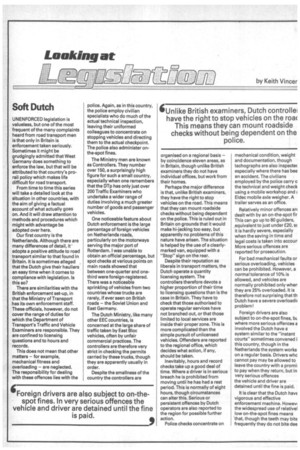Soft Dutch
Page 52

If you've noticed an error in this article please click here to report it so we can fix it.
UNENFORCED legislation is valueless, but one of the most frequent of the many complaints heard from road transport men is that only in Britain is enforcement taken seriously. Sometimes it might be grudgingly admitted that West Germany does something to enforce the law, but that will be attributed to that country's prorail policy which makes life difficult for road transport.
From time to time this series will take a detailed look at the situation in other countries, with the aim of giving a factual account of what actually goes on. And it will draw attention to methods and procedures which might with advantage be adopted over here.
Our first country is the Netherlands. Although there are many differences of detail, it adopts a positive attitude to road transport similar to that found in Britain. It is sometimes alleged , that the Dutch give their hauliers an easy time when it comes to compliance with legislation. Is this so?
There are similarities with the British enforcement set-up, in that the Ministry of Transport has its own enforcement staff. These officials, however, do not cover the range of duties for which the Department of Transport's Traffic and Vehicle Examiners are responsible. They are confined to licensing questions and to hours and records.
This does not mean that other matters — for example, mechanical fitness and overloading — are neglected. The responsibility for dealing with these offences lies with the police. Again, as in this country, the police employ civilian specialists who do much of the actual technical inspection, leaving their uniformed colleagues to concentrate on stopping vehicles and directing them to the actual checkpoint. The police also administer onthe-spot fines.
The Ministry men are known as Controllers. They number over 150, a surprisingly high figure for such a small country, especially when one remembers that the DTp has only just over 200 Traffic Examiners who undertake a wider range of duties involving a much greater number of goods and passenger vehicles.
One noticeable feature about Dutch enforcement is the large percentage of foreign vehicles on Netherlands roads, particularly on the motorways serving the major port of Rotterdam. I was unable to obtain an official percentage, but spot checks at various points on main roads showed that between one-quarter and onethird were foreign-registered. There was a noticeable sprinkling of vehicles from two countries whose trucks are rarely, if ever seen on British roads — the Soviet Union and East Germany.
The Dutch Ministry, like many other EEC countries, is concerned at the large share of traffic taken by East Bloc vehicles, often by unfair commercial practices. The controllers are therefore very strict in checking the permits carried by these trucks, though they are apparently usually in order.
Despite the smallness of the country the controllers are organised on a regional basis — by coincidence eleven areas, as in Britain, though unlike British examiners they do not have individual offices, but work from their homes.
Perhaps the major difference is that, unlike British examiners, they have the right to stop vehicles on the road. This means that they can mount roadside checks without being dependent on the police. This is ruled out in Britain on grounds that it would make hi-jacking too easy, but apparently no problems of this nature have arisen. The situation is helped by the use of a clearlymarked van, equipped with a "Stop" sign on the rear.
Despite their reputation as liberals in transport matters, the Dutch operate a quantity licensing system. The controllers therefore devote a higher proportion of their time to licensing questions than is the case in Britain. They have to check that those authorised to operate regular services have not branched out, or that those limited to local services are inside their proper zone. This is more complicated than the simple pursuit of unlicensed vehicles. Offenders are reported to the regional office, which decides what action, if any, should be taken.
Inevitably, hours and record checks take up a good deal of time. Where a driver is in serious breach he is prohibited from moving until he has had a rest period. This is normally of eight hours, though circumstances can alter this. Serious or persistent offences by Dutch operators are also reported to the region for possible further action.
Police checks concentrate on mechanical condition, weight and documentation, though tachographs are also inspectec especially where there has bee an accident. The civilians employed by the police carry o the technical and weight check using a mobile workshop and Eldec mobile axle weigher. A trailer serves as art office.
Relatively minor offences ar( dealt with by an on-the-spot fir This can go up to 80 guilders, equivalent to just under E20, sc it is hardly severe, especially when the saving in time and legal costs is taken into accoun More serious offences are reported for prosecution.
For bad mechanical faults or serious overloading, vehicles can be prohibited. However, a normal tolerance of 10% is allowed, and vehicles are normally prohibited only when they are 25% overloaded. It is therefore not surprising that th Dutch have a severe overloadir problem!
Foreign drivers are also subject to on-the-spot fines, bt. where more serious offences a involved the Dutch have a system similar to the "instant courts" sometimes convened i this country, though in the Netherlands the system works on a regular basis. Drivers who cannot pay may be allowed to leave the country with a promil to pay when they return, but in very serious offences the vehicle and driver are detained until the fine is paid.
It is clear that the Dutch havE vigorous and effective enforcement machine. Howev, the widespread use of relativel low on-the-spot fines means 'that, though the teeth may bite frequently they do not bite dee






















































